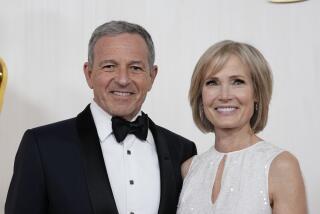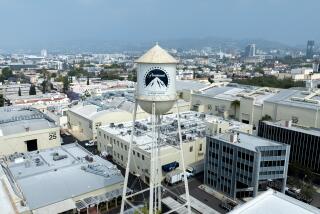Golden West Makes Golden Deal : ‘Cinderella Story’ Nets $24 Million for 17 KTLA Investors
When Anthony Cassara put together the deal that bought KTLA Channel 5 in Los Angeles from former cowboy star Gene Autry in 1983, he and his partners were regarded as foolish for paying a record $245 million for the independent station.
At the time, the entertainment and communications world was rife with gloomy forecasts for commercial TV stations, particularly in the summer of 1982 when Cassara, then KTLA’s general manager, dreamed up the deal.
“The trade papers were saying that over-the-air-broadcasting was on its last legs, in fact, and the networks were all going to fall apart and cable was going to take over the world and whatever cable didn’t do, DBS (direct broadcast satellites) would do,” he said. Independent television stations, in particular, were “the lepers of the communications industry,” he recalled. “We were doomed, we had no future.”
Instead, non-network stations emerged bigger and stronger than ever, registering an increase among viewers in major markets while the number watching network affiliates steadily eroded. In Los Angeles, regarded as the nation’s most competitive TV market, KTLA has solidly established itself as the ratings leader among independent stations, and it is widely acknowledged to be one of the three most profitable independents in the country.
Sold for $510 Million
Last month, KTLA was sold to the Chicago-based Tribune Co. for more than double the price Cassara’s group paid: $510 million. It is the highest amount ever paid for a TV station.
The deal is subject to approval by the Federal Communications Commission, which is expected to sanction the license transfer within a few months. When that happens, 17 members of KTLA’s management who were members of Cassara’s buy-out group in 1983 will be greatly enriched.
To buy into Golden West Television, the company formed to purchase KTLA from Autry, the 17 station managers personally invested a total of about $5.5 million and borrowed much of the rest, using the station’s assets as collateral. Three years later, the KTLA management group’s share of profits from the Tribune sale should total about $24 million. The remaining proceeds will go to pay back the loans and reward Kohlberg, Kravis, Roberts & Co., the specialist in leveraged buy-outs that put together the Autry sale and now owns about 90% of Golden West Television.
By far the largest individual share of the KTLA management group’s profit will go to Cassara, 41, who began working at the station in sales 13 years ago.
Create Millionaires
The combined shares owned by KTLA’s management, around 10%, will create at least three or four millionaires at the station, not counting Cassara , who reluctantly conceded that he was a millionaire “on paper, I guess,” before the 1983 buy-out. Now there’s no question about his millionaire status. The only question is how many millions he will have.
“I haven’t figured it out yet,” Cassara said last week, before departing for a vacation in Tahiti. Cassara borrowed $3 million to purchase 5% of Golden West during the 1983 leveraged buy-out. Since then, he has reduced his stake to slightly less than 4%. That will amount to at least $9.72 million when the sale is closed, according to the FCC documents.
However, according to sources at both Kohlberg and the station, the figures yielded from ownership information in the FCC documents are lower than the reality, because they don’t reflect the profit on stock options exercised by KTLA’s management. Those options “significantly” increase some stakes, one source said.
Most KTLA executives were unwilling to disclose the exact amount of their profit share, but the following figures, based partly on FCC data and excluding options, are a guideline.
Stock Options
They show that at the very least, five KTLA executives, including Cassara, will receive more than $1 million on the deal: $1.74 million for George Vandeman, general counsel; $1.6 million for general manager and senior vice president Steven Bell; $1.1 million for chief financial officer and senior vice president William Schickler; and $1.2 million for station manager and vice president Michael Eigner.
However, sources said the figure given for Schickler, for example, is “way low,” in light of Schickler’s stock options. And Bell’s $1.6-million profit is based on the FCC’s ownership figure for Bell of 93,333 shares; he actually has another 40,000 shares because of his stock options.
Even those who invested the minimum $25,000 for a 0.04% stake in Golden West will collect about $100,000 at worst, and perhaps much more, with options. The 0.2% share owned by Eileen Gereghty, a KTLA local sales manager and the only woman in the Golden West group, should yield more than half a million dollars.
“It’s a fairy tale story, a Cinderella story,” station manager Eigner said.
Decade of Employment
But Schickler, noting that the participants averaged a decade or more of employment at the station before they became co-owners in 1983, said: “This (the profits from the Tribune sale) can’t be looked on as making money overnight.”
Another participant, Hector Highton, was a former hockey player when he started work at KTLA as a stagehand 34 years ago. “Television was just a baby then,” said Highton, who is now vice president in charge of operations and sports for KTLA. “When you work for the same company for 34 years and then get a plum like this,” he said, “It’s really like the end of the rainbow.”
Management had plenty of incentive to try a leveraged buy-out in 1983. Under Autry, KTLA was successful but no one other than Autry and his co-owner, San Diego-based Signal Cos., had equity in the station. “People around here--and I was in the forefront--felt very discouraged,” Schickler said.
The discouragement, he said, was fueled by failure of the company to grow because Autry and Signal weren’t particularly interested in acquiring other TV stations, although “they certainly had the financial wherewithal to do it.”
‘Tremendous Risk’
Despite that incentive, however, the buy-out seemed a “tremendous risk” to some of the participants when they first heard the idea proposed, Eigner said. Most of the KTLA people involved not only had to borrow large sums to make their personal investments, they were also suddenly liable, as co-owners, for the $200 million that Golden West borrowed to finance the buy-out.
“When we had to sign the notes . . . it was as large a commitment, in terms of risk, that most of us had ever undertaken,” Eigner said.
In fact, Cassara recalled that when he originally proposed the buy-out to his colleagues, he was met with wide-eyed gazes accompanied by “long pauses of silence.” “I think they thought I was crazy,” he said.
But none of his KTLA colleagues admits to that today. Said Highton: “No way I’d say Tony Cassara is crazy. I watched him grow within the company when he was a young man in sales and he is all business, total, total business . . . he knows when to make the right moves.”
Only Mistake
According to several Golden West officials, the goal was always to sell the station for half a billion dollars one day. But that price seemed fantastic in 1983, Eigner said, considering that the $245 million paid by the group for KTLA was then the record price for a TV station. (And also considering that, according to Cassara, they were called “idiots” for paying that much.)
Said Cassara, “I thought it would take five to eight years (to get half a billion for KTLA). That was the only mistake I made.” One reason that KTLA was able to fetch $510 million now instead of later was a relaxation earlier this year by the Federal Communications Commission of TV station ownership rules that permits a single owner to hold more than five stations. That decision that has touched off a mad rush to buy broadcast properties.
The Kohlberg firm is among those doing the buying. In April, 1984, a year to the day after Kohlberg made its first station purchase (KTLA), it arranged the purchase of six more TV stations as well as cable-TV properties in an $842-million acquisition of Wometco Enterprises. Although Kohlberg has sold one of its Wometco stations and has an agreement to sell another, it is now in the process of arranging a buy-out of Storer Communications, which will give it seven additional stations .
Kohlberg will rank as the sixth-largest broadcast group owner in the country in terms of audience reach, behind only the three national TV networks, Tribune Co. and 20th Century Fox (which is in the process of acquiring Metromedia’s stations), if all the currently pending station acquisitions and sales are approved.
Part of a Group
“We always felt that for KTLA to continue to grow, it needed to be part of a group,” said Cassara, adding that before selling the station to Tribune Co., Golden West wanted to acquire Tribune Co. in order to obtain its TV stations. “We approached them to talk about it,” he said, “but . . . they would not have a meeting with us and so ultimately we ended up selling to them, which is what they wanted.”
For Tribune Co., whose TV holdings include independent stations in New York and Chicago, the KTLA purchase represents more than a single station. It gives the company stations in the nation’s three largest metropolitan markets and greatly enhances the company’s ability to develop its own programming.
“Two years from now, people will look back at the price they paid ($510 million) and call it a steal,” Cassara said.
More to Read
The biggest entertainment stories
Get our big stories about Hollywood, film, television, music, arts, culture and more right in your inbox as soon as they publish.
You may occasionally receive promotional content from the Los Angeles Times.










